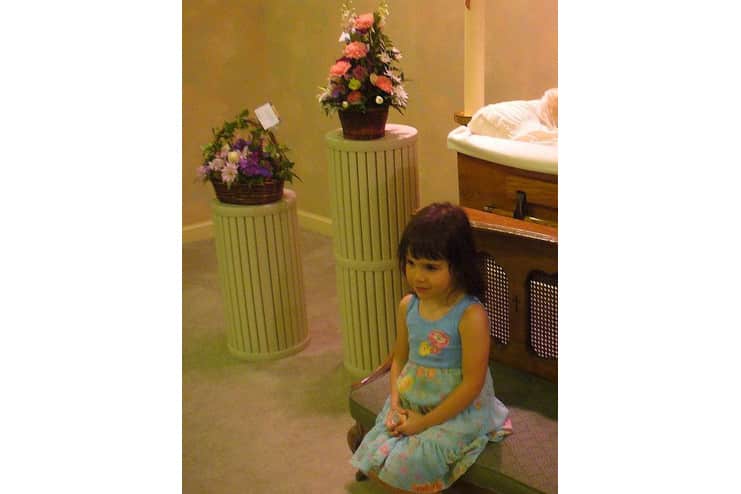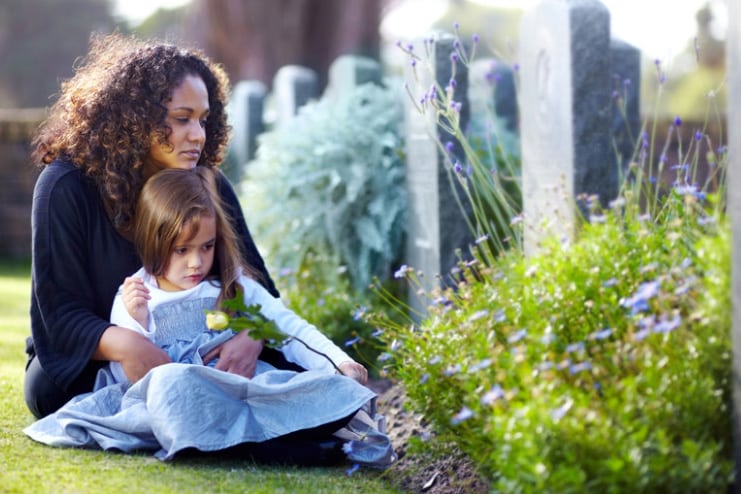Death is one of the hardest subjects to deal with the child. Children might encounter the death of the dearest one in the family, or their family pet or bugs/insects alongside the road.
It is not always possible to tell the children tales when they ask about their loved one who was dead. There is a need to explain the child about the death and help them to cope with the grief and loss of their dear one.
This article presents the ways to talk to kids about death. It discusses the Do’s and Don’t of talking with the child about death.
Why do children need to be explained about death?

Though children have sensitive hearts they should be able to recover quickly from the hard situations. Children between the age of 5-7 may be exposed to the concept of grief in TV shows or story books.
Children may feel depressed when they see the people around then sorrow. They may push themselves into frustration when they did not see the presence of their loved one from the past few days.
The way that children presume about death is different from the reality. They might think that death is temporary and the deceased person may return one day. It is necessary to tell your child the truth at the appropriate age. Once they grow up it is very difficult to heal the grief.
Child’s perception about the death at various stages of the life is as follows:
Preschool children’s view of death: Preschool children think that death is temporary. Because, they notice in many fairy tales they watch, the characters suddenly rise up alive after being destroyed completely.
Children between the age of 5 and 9: Children at this age realize that all the living things die at some stage and death is final. Some children have nightmares about the death. They might encounter the images that are associated with the death such as skeletons, tombs etc.
Children above 9 Years: Children at this age will get a complete understanding of the death and they realize that everyone will die someday.
There are a few reasons to teach your child about death:
Reason #1: To help then to recover from the loss of their loved one at early stages of childhood
Help your child to realize the loss of their loved one at the early stages of their childhood. Children who are taught about death early in their childhood can recover from the loss easily and quickly.
Reason #2: Give them a chance to remember the deceased
Give your child an opportunity to remember the deceased one and honor their memory by participating in the death anniversaries.
How to Explain Death to Children?

Every child dealing with the loss of their loved one needs proper support from their parents. It is necessary to teach the child in a right manner at the appropriate age. It is very challenging to teach the preschool kids about death. Here are a few ways to talk to your child about death:
1. Use simple and clear words with concrete examples:
To express the sad news to your child, approach your child in a gentle and caring way. Mention the relation of the deceased one with your child and tell them that they can not see that person anymore. Let your kid take in your words.
2. Be more Straightforward:
Tell your child facts about the death. Children especially of the preschool age are not enough to understand the things in depth. Make your explanation as simple as possible and help children to understand about the death. Give them a straightforward explanation about the loss of their dear one. Make them the truth simple by telling that death is permanent and they can not see the deceased person further but still we can memorize them by conducting death anniversaries.
3. Explain them serious ill conditions that leads to death:
It is very important to tell your kid that all the ill conditions do not lead to death. This kind of perception may make them afraid of the general ill conditions like fever, cold, constipation etc. Avoid the confusion of your preschool kid by explaining that only serious ill conditions lead to death. Add that chronic ill conditions rarely attack a few people.
4. Don’t let your child to be impacted by the loss:
It’s most common to think of the loss of a loved one and get into sorrow. But, don’t let your child lose attention and care. If you neglect your child thinking of the loss of the loved one they may be at the risk of being affected by the behavioral changes. Stick back to your responsibilities as soon as possible and secure them from the negative impacts of the emotional imbalance.
5. Talk about rituals and funerals:
Talk to your kid about the rituals and funerals that may vary as per the religion. Make your kid comfortable by explaining the things ahead of the time. Explain to your kid the religious procedures that you follow to offer condolence to the death of the family member.
6. Involve your child:
Involve your child in the memorial service by making them pick a poem or photos to be displayed. Whether your kid may not be affectionate towards the one who has passed, tell your kid about the actions that are to be avoided at the memorial service.
7. Don’t kill the hope of your child:
It is very important to explain to your child that life has to go on and everything will be fine at some point. Let them understand the fact that there is no way to bring back the deceased one to life.
8. Let your kid to accept what has happened:
As we all are aware death may occur in many ways like severe illness, accidents, suicides. Death can be sudden, expected, unexpected, and prolonged. Explain the reason for the death in a gentle way.
9. Prepare yourself to face the reaction of your child:
All the kids may not respond alike to the loss of the loved one. Some may cry and some kids may start asking the frequent questions. Make sure that your kid does not slip into behavioral changes.
10. Offer your child comfort and reassurance:
Make sure that your kid is not affected by the loss incurred due to the death of the loved person. Tell your kid that it takes some time to recover from the grief. Protect your kid from the nightmares by avoiding the discussions that are out of their scope.
11. Provide your kid the ways to feel better:
Help your kid with the ways to forget the loss of the loved one. Shift your kid towards some interesting activities like drawing, painting, craft making, and cooking. Never let your kid sit alone. Engage your child in busy activities.
12. Help your child to express their emotions:
Sit with your child and ask them to express their feelings days or months after the loss. Share your feelings too with your kid if required. It helps them to make your kids comfortable with their emotions. Offer your child comforting things when they think about the person who has died.
13. Respond properly to the emotions of your child:
Pay attention to the feelings of your child. Ask your kid to express their feelings and emotions. Help your kid if they experience any nightmares. Read out some funny bedtime stories. This will help them to achieve healthy sleeping habits.
14. Be cautious while answering your kid’s questions:
Kids may ask you several questions over the time. Your kid may ask your the reason for the death. Give them the realistic answers quoting the reason for the death. No need to specify the process of how the person has died.
15. Help your child to preserve the memories of their loved one:
Help your child to draw the pictures of their loved one and write some stories about them. This helps them to remember that person often and grow with their memories.
16. Prepare your child for the future without the presence of your loved one:
Make your child strong enough to move without the loved person. Tell them the fact that we have to accept the bad consequences that enter our life often.
17. Motivate your child:
Motivate your child to recover from the loss by telling them the responsibility to fulfill the dreams of the person who has died. Encourage your child by saying that the person is alive in their activities.
Do’s and Don’t of talking with your child about death:
Here are a few things to keep in mind while helping your child deal with death.
Do’s:
1) Be truthful:
Give truthful explanations to your kid for your sorrow. Being open will help your kid to heal the grief quickly with your emotional support.
2) Use Realistic Words:
Use realistic words like dead or dead which helps the grieving process easily. Prefer using the sentences like passes away, lost, crossed over etc.
3) Provide information in small bits:
Preschool kids are not strong enough to hold the hard things in their tiny brain. Offer your child the left over information when they raise questions.
4) Cry:
Cry with your child and help them to expel the negative feelings. Offer your kid more caring when you notice that they are feeling lost.
5) Take care of yourself:
Taking care of yourself will help to provide better support and encouragement for your kid. Make yourself a good role model because children will do what they see.
Don’ts:
1. Don’t hide feelings and emotions from your child:
Seeing your crying makes your kid understand that the sad feeling is common after the significant loss of the loved one. Share the memories of your loved one who was dead along with your child.
2. Don’t lose attachment with your child:
Don’t neglect your child thinking of your loved one’s death. This makes your kid feel alone and may create a negative impact on his development.
3. Don’t change your daily routine:
Never let your feelings and emotions have a negative impact on your daily routines at home and work. It is perfectly fine to cry to get relief from the loss.
4. Don’t let the death to put ban on your joy and laughter:
We all know that death is irreversible and our continuous dejection do not bring back the lost one. Laughter is a great tool to overcome the distress and move ahead. Ensure that your kid is able to enjoy life the same way as they did earlier before the death of the loved one.
5. Don’t use the words that confuse your child:
Children are often confused with death and sleep. Never use the phrases like- they died in their sleep. Your child may often feel afraid to go to bed. Avoid the words like ‘sleep’, ‘rest’, and ‘went away’.
In conclusion, it is essential to speak to your kid about the death at the appropriate age. The tips provided in this article will help you to deal with the child who struggles from the loss of their loved one.










































